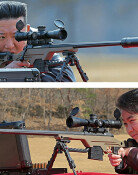Refugee to See Sons After 4 Years
Refugee to See Sons After 4 Years
Posted November. 14, 2006 07:43,
It has taken four years for Briky Asu (fictitious name), a Burmese national, to finally meet his two sons after their separation four years ago.
Asu was recognized as a refugee by the Korean government last December. His two sons will come to Korea later this month.
This is the first official instance of the refugee family reunion law that allows a refugee living in Korea to bring his or her family to Korea.
It is the result of efforts involving a number of groups at home and abroad including the International Organization for Migration, Red Cross, the Ministry of Justice, the Ministry of Foreign Affairs and Trade, the National Institute of Scientific Investigation, and Korean National Red Cross. Involved groups prepared this family reunion plan for the past 10 months under tight secrecy.
18 years of wandering and separation-
Asu, one of the ethnic minorities in Myanmar, left his country 18 years ago and took refuge in foreign countries illegally. He was a 25-year-old college student when he engaged in the 8888 Uprising, a resistance against the Burmese military junta on August, 8, 1988.
His involvement in the uprising forced him to flee from his own country and seek asylum, and his father and uncle were tortured by the authorities. His uncle died after torture and his father was imprisoned. He felt his life was threatened and he was smuggled in a small wooden boat to Thailand. He married a Burmese, also an illegal immigrant, in Thailand and had two children. But he barely made ends meet because landing a job wasnt easy for him. He couldnt go back home because of harsh oppression of the military junta on ethnic minorities.
After spending 14 desperate years in Thailand, he was smuggled to Japan leaving his two sons behind in 2002. He parted with his wife. His older son, who turned 11 this year, took shelter in a refugee camp in Bangladesh, and his younger son, who turned 9 this year, was taken under the custody of his uncle living in Thailand. He chokes up in tears when he remembers the moment that he said, I will see you in a few months.
He had a hard time finding jobs in Japan too because he was an illegal immigrant. He couldnt put bread on his table, let alone bring his children.
He headed for Korea in November, 2002, helped by the Burmese minority association in Japan. He applied for refugee status to the Korean government the following year and he was recognized as a refugee at the end of last year after a two-year examination.
First he barely made his living by cleaning and making meals in a mosque, and then he went from one manual labor job to another. His living conditions finally improved a little bit after he was employed by a manufacturing company, but still it was beyond his imagination to bring his children to Korea.
A secret plan for family reunion-
He heard welcome news in January. The International Organization for Migration applied for the refugee family reunion program to help him. But it was not an easy process. His sons had no birth certificates or identification documents because they were born as sons of an illegal immigrant.
The Korean National Red Cross came forward to lend a helping hand. The organization informed to the Ministry of Justice that Red Cross would issue travel certificates if the Korean embassies in Thailand and Bangladesh send official documents that warrant a right to enter the country. Red Cross collected DNA samples of the two sons from Thailand and Bangladesh.
The Ministry of Justice, which initially showed disapproval, leveraged the Ministry of Foreign Affairs to ask the Korean embassies to cooperate in sending needed documents and sent the DNA samples to the National Institute for Scientific Investigation to conduct paternity tests.
The 10-month effort has been a complicated process. An official of the Justice Ministry said, The two sons will also be recognized as refugees so that they can live together. This will serve as an opportunity to show that Korea is a country abiding by international law and rules on human rights.
woogija@donga.com







